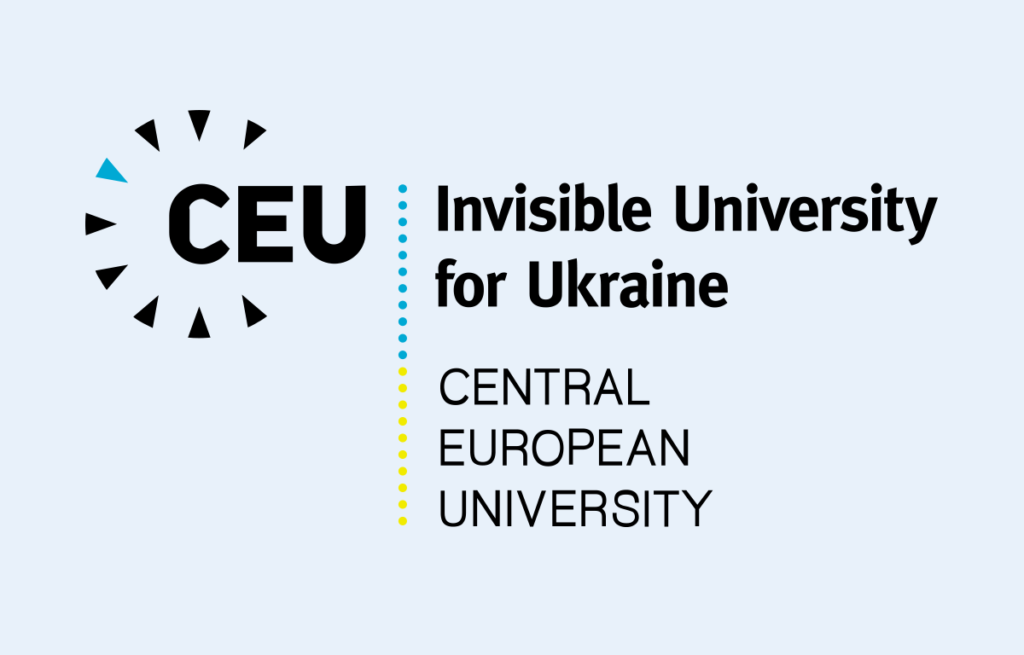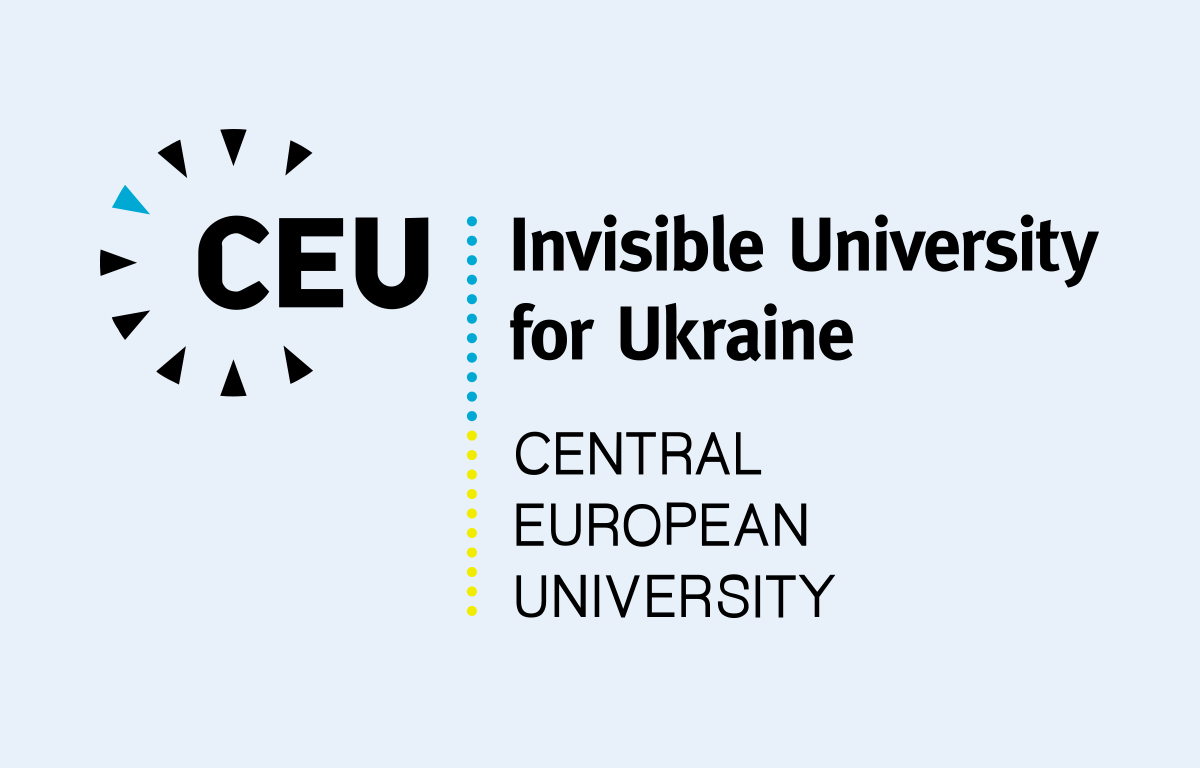
Invisible University for Ukraine (IUFU) is a certificate program for Ukrainian undergraduate and graduate students, whether residing in Ukraine or in refuge, whose studies have been affected by the war.
The program offers an intensive learning experience on the role of Ukraine in changing European and global contexts, placing questions relevant for Ukrainian students into a transnational comparative perspective. The name of this solidarity program evokes the underground and exile educational initiatives (such as the “flying universities”), as well as the tradition of Invisible Colleges formed after 1989 in Eastern Europe.
The program is not meant to replace or duplicate the existing education opportunities in Ukrainian universities, but to support them by filling the gaps that temporarily emerged because of the Russian invasion. By strengthening the ties of Ukrainian educational institutions, scholars, and students to transnational networks, we hope to counter the destructive effects of brain drain through creating access to educational infrastructure and academic knowledge for students irrespective of their current location.
The program is designed in a hybrid format (online teaching with on-site meetings in Budapest and Lviv in the form of winter and summer schools, as well as possible research visits to a variety of European academic centers).
The educational program is comprised of three components:
- thematic courses
- mentoring
- skill-building (academic English, academic writing), career support for future education, and psychological support.
The program is implemented by Central European University (Budapest Campus) in cooperation with Imre Kertész Kolleg, University of Jena, as well as other Ukrainian (Ivan Franko National University of Lviv, Ukrainian Catholic University) and global university partners and research institutions (such as the Center for Urban History of East Central Europe in Lviv).
Spring 2025 Offerings
Thematic Courses
In the Spring Semester of 2025, IUFU offers 6 online interdisciplinary courses:
- Elemental Warfare. From Colonial Legacies to Decolonial Resistance & Solidarity (Course director: Svitlana Matvienko, Simon Fraser University)
- Belarus-Lithuania-Poland-Ukraine: Polycentric Narratives and Legacies (Course co-directors: Elzbieta Kwiecinska, Polish Academy of Sciences, and Iryna Ramanava, European Humanities University). This course is also open to Belarusian students committed to democratic values who are currently studying in the countries of the European Union, UK, and USA
- Migrations and Diversity in Modern East-Central Europe (Course co-directors: Oleksiy Chebotarov, University of Oslo, and Vladyslava Moskalets, Lviv Center for Urban History / Ukrainian Catholic University)
- Rule of Law Ideals: Legal Reforms in Ukraine amidst War and Peace (Course co-directors: Marta Mochulska, Ivan Franko University of Lviv, and Nazarii Stetsyk, University of Vienna)
- Research Methods for the Social Sciences (Course co-directors: Levente Littvay, CEU Democracy Institute, and Inna Melnykovska, CEU)
- Semi-periphery and Borderlands in the European Integration: Rethinking Balkans for Ukraine (Course co-directors: Marija Mandić, University of Belgrade, and Olesia Marković, Kyiv- Mohyla Academy)
Application Process
Deadline for applications: 10 February 2025, midnight, 12 pm (CET).
Admitted course participants will be notified by 20 February 2025. The results of the research scholarship selection will be communicated by 25 February 2025.
The envisioned duration of the Spring Semester classes is 24 February–23 May 2025. The
most motivated and successful participants will have an opportunity to participate in a
Summer School in July (a separate application form will be circulated in May).Who is eligible?
Any student who has been pursuing a BA, MA, or doctoral degree program in a Ukrainian university in the academic year 2021-22, or who started her/his university studies in 2022, 2023, or 2024. Participation in the program is free of charge.
How to apply?
Application periods begin in August–September and January–early February. Applicants should fill in the application form and send all application materials to iufu@ceu.edu. If you cannot access or use the application form, please indicate this in your application letter to iufu@ceu.edu.
Applications should include: a short motivation letter (up to 1 page), a CV, and, if applicable, a research project proposal.
- A short motivation letter (up to 1 page) should include: 1) reason for applying to IUFU and expectations from the course(s); 2) a description of the applicant’s thematic interests (e.g., research topic or thesis topic); 3) choice of preferred course(s) an applicant would like to take (up to 3) and indication of interest in Academic English classes.
- A short CV should include: 1) name in Ukrainian and in English as they appear in the applicant’s international passport, 2) e-mail address, 3) current location, 4) previous education, current university, student status and program of study, 5) involvement in civil activities/volunteering, 6) estimated level of English language competence.
- A research proposal (only for those who wish to apply for a research scholarship) should be between 400 and 800 words and include: 1) a title, 2) the main lines of the envisioned research project and its desired outcome, 3) references to the relevant sources and secondary literature on the topic, 4) indication of which course the research project is planned to be implemented in.
Applications can be submitted in English or Ukrainian.
Research Scholarships
Research scholarships (up to 800 Euro per semester) are available on a competitive basis for those BA, MA, and PhD students who wish to implement a special empirical or theoretical project in addition to their course work in IUFU, drawing on their academic background, previous work, current thesis project, and relevant to the current situation, and/or related to the themes of the courses.
Students receiving research funding will be required to submit a paper of 5000-6000 words based on their research at the end of the semester. The best papers will be published on the Visible Ukraine. Research scholarships can only be offered as a part of one of the courses. Those who receive the grant are required to participate in the course and the mentoring sessions.
How to apply?
Applications for the research scholarships should be sent together with the applications for the course(s). Students need to submit a research proposal with their application (between 400 and 800 words), containing a title, a description of the research project and its desired outcome, and references to the relevant sources and secondary literature on the topic. The applicant shall indicate within which course the research project is planned to be implemented.
